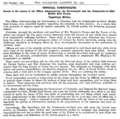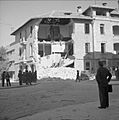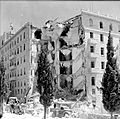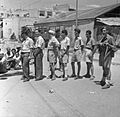Jewish insurgency in Mandatory Palestine facts for kids
Quick facts for kids Jewish insurgency in Mandatory Palestine |
|||||||
|---|---|---|---|---|---|---|---|
| Part of Sectarian conflict in Mandatory Palestine | |||||||
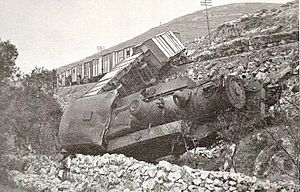 Palestine Railway K class 2-8-4T steam locomotive and freight train derailed from the Jaffa and Jerusalem line after being sabotaged by Jewish insurgents in 1946 |
|||||||
|
|||||||
| Belligerents | |||||||
|
|
||||||
| Commanders and leaders | |||||||
| Sir Evelyn Barker Sir Alan Cunningham Harold MacMichael Sir Gordon MacMillan John Vereker, 6th Viscount Gort John Rymer-Jones William Nicol Gray |
Menachem Begin Amichai Paglin Yitzhak Shamir Eitan Livni Nathan Yellin-Mor Moshe Sneh Yisrael Galili |
||||||
| Strength | |||||||
| British police: 4,000 policemen British Armed Forces: 100,000 troops (peak strength) |
Haganah: 21,000 troops
Lehi: 500 troops |
||||||
| Casualties and losses | |||||||
| 141 soldiers and police killed (August 1945 – August 1947) | 31 killed 7 executed 2 committed ... (August 1945 – August 1947) |
||||||
A successful paramilitary campaign was carried out by Zionist underground groups against British rule in Mandatory Palestine from 1944 to 1948. The tensions between the Zionist underground and the British mandatory authorities rose from 1938 and intensified with the publication of the White Paper of 1939. The Paper outlined new government policies to place further restrictions on Jewish immigration and land purchases, and declared the intention of giving independence to Palestine, with an Arab majority, within ten years. Though World War II brought relative calm, tensions again escalated into an armed struggle towards the end of the war, when it became clear that the Axis powers were close to defeat.
The Haganah, the largest of the Jewish underground militias, which was under the control of the officially recognised Jewish leadership of Palestine, remained cooperative with the British. But in 1944 the Irgun, an offshoot of the Haganah, launched a rebellion against British rule, thus joining Lehi, which had been active against the authorities throughout the war. Both were small, dissident militias of the right-wing Revisionist movement. They attacked police and government targets in response to British immigration restrictions.
The armed conflict escalated during the final phase of World War II, when the Irgun declared a revolt in February 1944, ending the hiatus in operations it had begun in 1940. Starting from the assassination of Baron Moyne by Lehi in 1944, the Haganah actively opposed the Irgun and Lehi, in a period of inter-Jewish fighting known as the Hunting Season, effectively halting the insurrection. However, in autumn 1945, following the end of World War II in both Europe (April–May 1945) and Asia (September 1945), when it became clear that the British would not permit significant Jewish immigration and had no intention of immediately establishing a Jewish state, the Haganah began a period of co-operation with the other two underground organisations. They jointly formed the Jewish Resistance Movement. The Haganah refrained from direct confrontation with British forces, and concentrated its efforts on attacking British immigration control, while Irgun and Lehi attacked military and police targets. The Resistance Movement dissolved amidst recriminations in July 1946, following the King David Hotel bombing. The Irgun and Lehi started acting independently, while the main underground militia, Haganah, continued acting mainly in supporting Jewish immigration. The Haganah again briefly worked to suppress Irgun and Lehi operations, due to the presence of a United Nations investigative committee in Palestine. After the UN Partition Plan resolution was passed on 29 November 1947, the civil war between Palestinian Jews and Arabs eclipsed the previous tensions of both with the British. However, British and Zionist forces continued to clash throughout the period of the civil war up to the termination of the British Mandate for Palestine and the Israeli Declaration of Independence on 14 May 1948.
Within the United Kingdom there were deep divisions over Palestine policy. Dozens of British soldiers, Jewish militants, and civilians died during the campaigns of insurgency. The conflict led to heightened antisemitism in the United Kingdom.
Contents
Casualties
A table of casualties sustained from August 1945 to August 1947 is shown below.
| Killed | Wounded | Total | |
|---|---|---|---|
| British | 141 | 475 | 616 |
| Jewish Insurgents | 40 | 23 | 63 |
| Jewish Others | 25 | 115 | 140 |
| Arabs | 44 | 287 | 331 |
| Others | 10 | 12 | 22 |
| Totals | 260 | 912 | 1172 |
Effects
Effect upon mutual British–Arab interests
Anglo-Arab relations were of vital importance to British strategic concerns both during the war and after, notably for their access to oil and to India via the Suez Canal. Britain governed or protected Oman, Sudan, Kuwait, the Arab Emirates, Bahrain and Yemen, had treaties of alliance with Iraq (the Anglo-Iraqi Treaty (1930) and the Anglo-Iraqi Treaty (1948)) and Egypt (Anglo-Egyptian Treaty of 1936). Transjordan was granted independence in 1946 and the Anglo-Jordanian Treaty of 1948 allowed Britain to station troops in Jordan and promised mutual assistance in the event of war.
Effects upon independence movements worldwide
According to the BBC documentary The Age of Terror: In the Name of Liberation, the successful Jewish struggle for independence in Palestine inspired numerous violent campaigns for independence in other countries of the world at the time, such as by the Malayan Communist Party in the Malayan Emergency and the FLN in the Algeria War. EOKA also used Irgun tactics in the Cyprus Emergency. Political scientist John Bowyer Bell, who studied both the Irgun and the Irish Republican Army, noted that many IRA men whom he interviewed in the 1960s had studied Menachem Begin's memoir The Revolt, and used it as a manual for guerilla warfare. Nelson Mandela studied the book and used it as a guide in planning the ANC's guerrilla campaign against the apartheid government of South Africa. The Palestine Liberation Organization also drew inspiration from the Irgun's success. In 2001, invading US forces in Afghanistan found a copy of The Revolt and other books on the Jewish insurgency in the library of an Al-Qaeda training camp.
Images for kids
See also
- 6th Airborne Division in Palestine
- Israel-United Kingdom relations
- List of Irgun attacks
- List of modern conflicts in the Middle East
- Suez Crisis
- Violent conflicts in the British Mandate of Palestine




